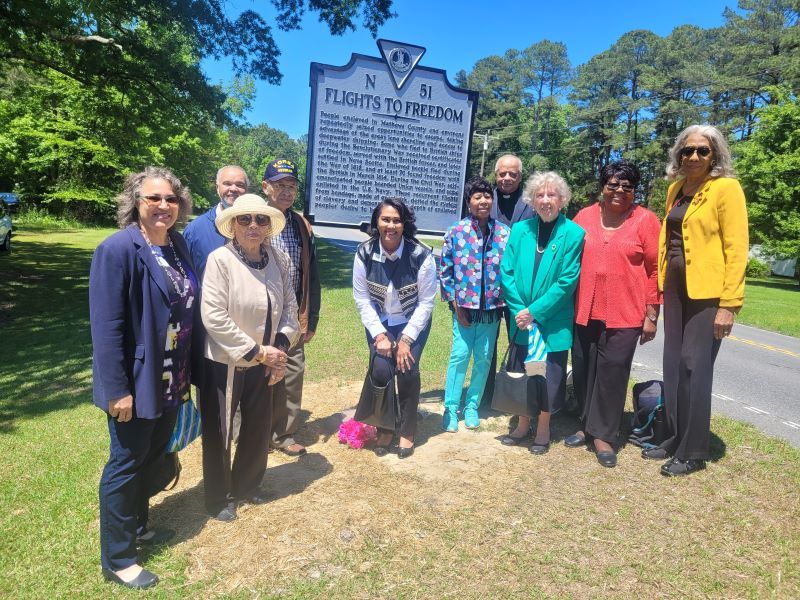
Department of Historic ResourcesAn official website of the Commonwealth of Virginia Here's how you knowAn official websiteHere's how you know

Department of Historic ResourcesAn official website of the Commonwealth of Virginia Here's how you knowAn official websiteHere's how you know

Virginia Department of Historic Resources
(dhr.virginia.gov)
For Immediate Release
May 13, 2024
Contact:
Ivy Tan
Department of Historic Resources
Marketing & Communications Manager
ivy.tan@dhr.virginia.gov
804-482-6445
—The marker highlights enslaved people’s flights to freedom throughout the 18th and 19th centuries—
—Text of marker reproduced below—
PLEASE NOTE: DHR creates markers not to “honor” their subjects but rather to educate and inform the public about a person, place, or event of regional, state, or national importance. In this regard, erected markers are not memorials.
RICHMOND – A state historical marker issued by the Virginia Department of Historic Resources (DHR) was dedicated over the weekend focused on enslaved people’s escape from bondage in Mathews County and the surrounding areas during the Revolutionary War, the War of 1812, and the Civil War.
The dedication ceremony for the marker was held Saturday, May 11, beginning at 11:30 a.m., at the marker’s location on the grounds of First Baptist Church, located on 9654 Buckley Hall Road in Mathews (23109). The event was free and open to the public.
The dedication began with welcoming remarks and an invocation by Evangelist Rose Mason, Interim Pastor of First Baptist Church, followed by an opening performance from the Emmaus Baptist Church Sanctuary Choir. Pastor Marcus Stallworth of Mathews Chapel United Methodist Church delivered the Statement of Libation, and Reed Lawson, President of the Mathews County Historical Society, provided greetings and introductions. Those who also spoke at the ceremony included Mathews County Historian Martha W. McCartney; Dr. Cassandra Newby-Alexander, Professor of History at Norfolk State University and author of Virginia Waterways and the Underground Railroad (2017); Bessida Cauthorne White, President of the Middle Peninsula African-American Genealogical & Historical Society; and Dr. Colita N. Fairfax, Chair of the Virginia Board of Historic Resources and Norfolk State University Professor. A public reception will be held in the church’s Fellowship Hall after the dedication ceremony.
Enslaved people in and around Mathews County seized opportunities to escape by using the area’s expansive shoreline and access to deepwater shipping. Some individuals who fled to British ships during the Revolutionary War served with the British forces, were given certificates of freedom, and later settled in Nova Scotia. Enslaved people also escaped to freedom during the War of 1812. At least 70 individuals fled with the British in March 1814. During the Civil War, self-emancipated people boarded Union ships, and some enlisted in the U.S. Navy. Enslaved people fled from bondage, defying the institution of slavery, at great risk to their lives. These flights to freedom demonstrated enslaved people’s profound desire to be free.
The Virginia Board of Historic Resources, which is authorized to designate new state historical markers, approved the manufacture and installation of the Flights to Freedom marker in December 2022. The dedication event was hosted by the congregation of First Baptist Church. The Mathews County Historical Society, Inc., the marker’s sponsor, covered the manufacturing costs of the marker. The Mathews Branch NAACP #7090 co-sponsored the dedication event with the historical society.
Virginia’s historical highway marker program began in 1927 with installation of the first markers along U.S. Route 1. It is considered the oldest such program in the nation. Currently there are more than 2,600 state markers, mostly maintained by the Virginia Department of Transportation, except in those localities outside of VDOT’s authority.
Full Text of Marker:
Flights to Freedom
People enslaved in Mathews County and environs repeatedly seized opportunities to escape, taking advantage of the area’s long shoreline and access to deepwater shipping. Some who fled to British ships during the Revolutionary War received certificates of freedom, served with the British forces, and later settled in Nova Scotia. Enslaved people fled during the War of 1812, and at least 70 found freedom with the British in March 1814. During the Civil War, self-emancipated people boarded Union vessels, and some enlisted in the U.S. Navy. These recurrent flights from bondage, made at great risk, defied the system of slavery and demonstrated the depth of enslaved peoples’ desire to be free.
###
Programs
DHR has stimulated more than $4.2 billion dollars in private investments related to historic tax credit incentives, revitalizing communities of all sizes throughout Virginia
DHR has secured permanent legal protection for over 700 historic places - including 15,000 acres of battlefield lands
DHR has erected 2,532 highway markers in every county and city across Virginia
DHR has registered more than 3,317 individual resources and 613 historic districts
DHR has engaged over 450 students in 3 highway marker contests
DHR has stimulated more than $4.2 billion dollars in private investments related to historic tax credit incentives, revitalizing communities of all sizes throughout Virginia
DHR has secured permanent legal protection for over 700 historic places - including 15,000 acres of battlefield lands
DHR has erected 2,532 highway markers in every county and city across Virginia
DHR has registered more than 3,317 individual resources and 613 historic districts
DHR has engaged over 450 students in 3 highway marker contests
DHR has stimulated more than $4.2 billion dollars in private investments related to historic tax credit incentives, revitalizing communities of all sizes throughout Virginia